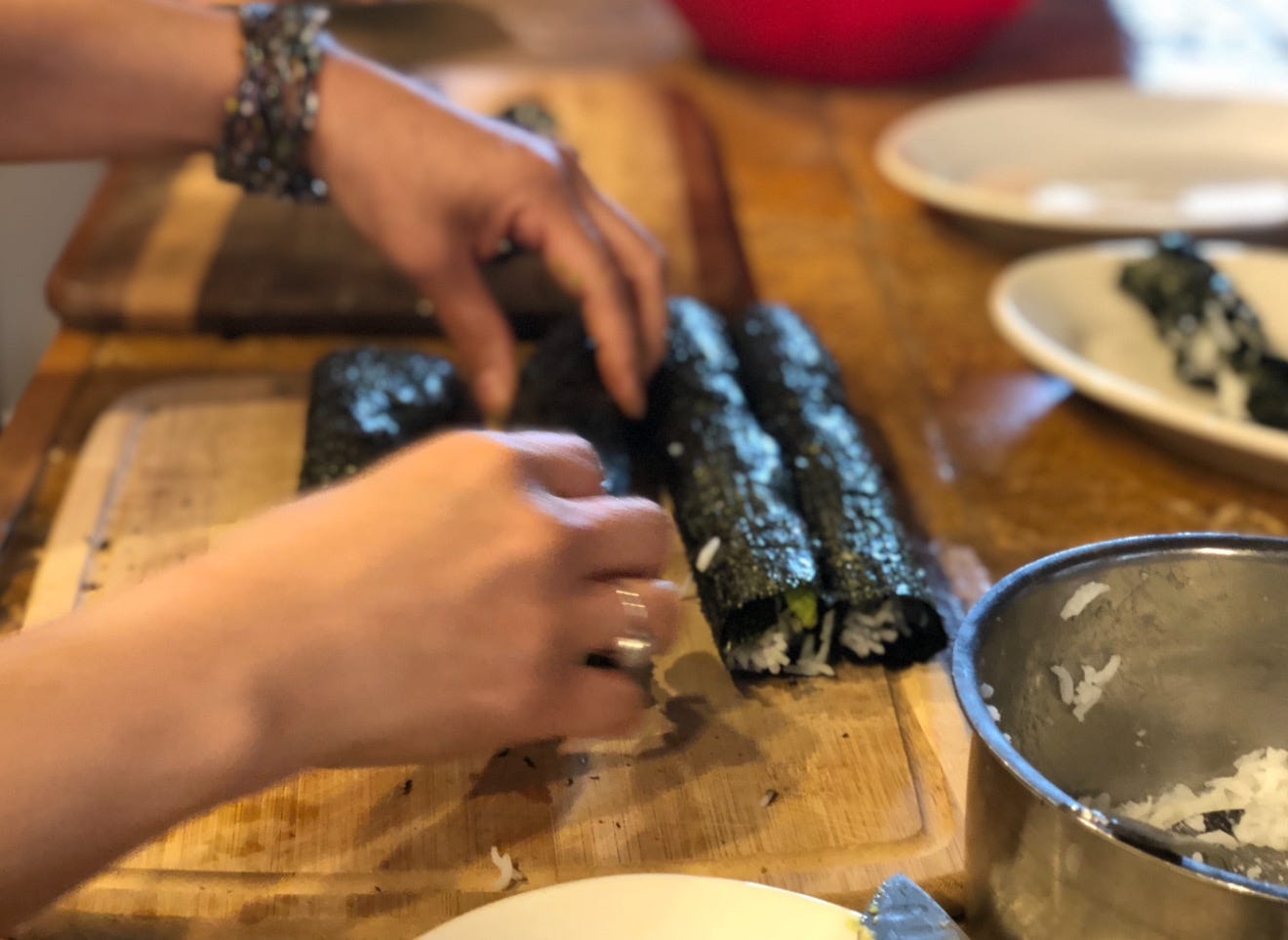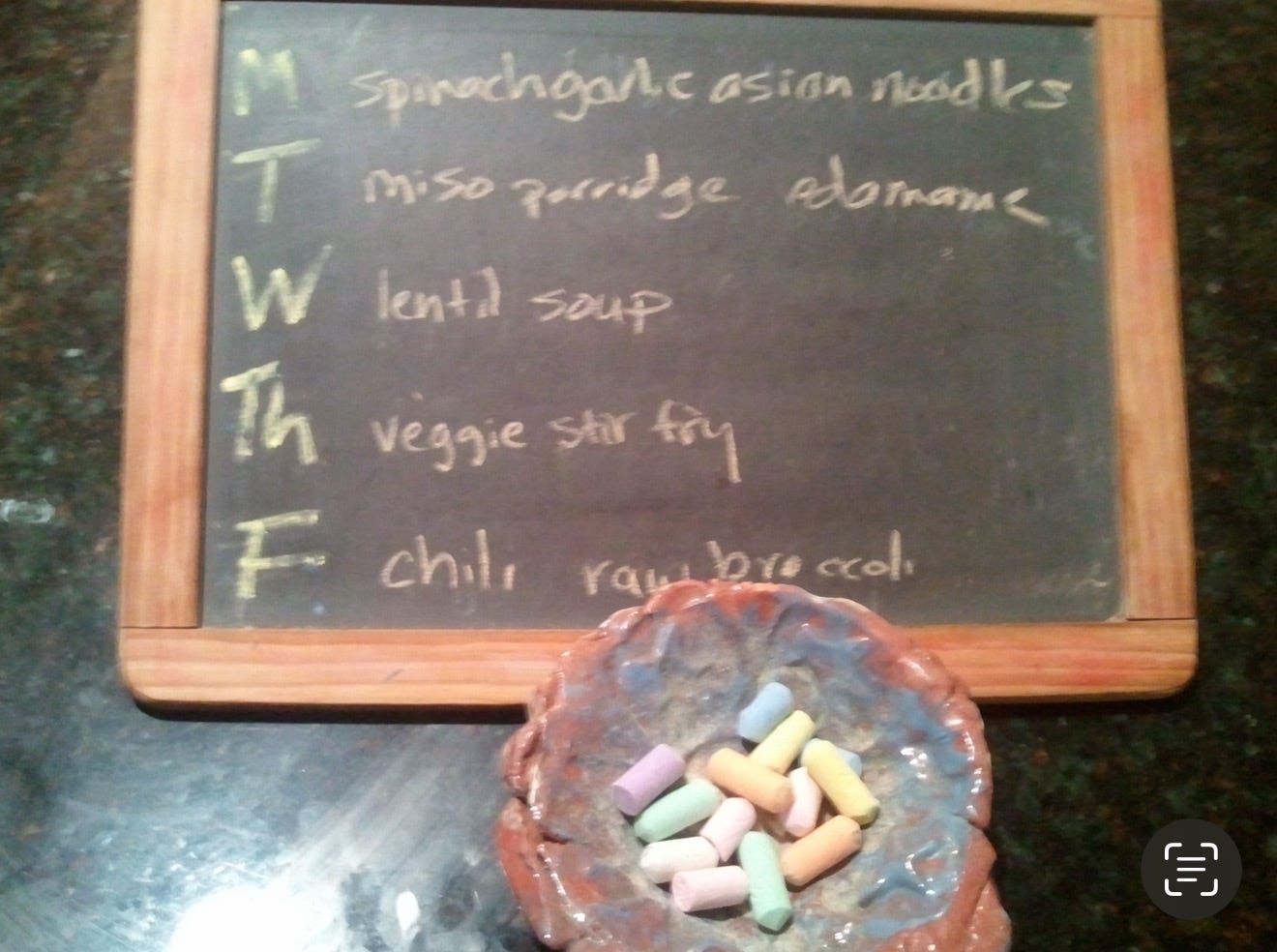Why I don’t meal prep (the way you think)
How rhythmic planning nourishes the nervous system better than rigid prepping
I planned, but I didn’t pre-pack
I never did the tower-of-Tupperware thing.
You know, where every lunch and dinner for the next seven days is sealed in plastic, pre-decided, and stacked. I’ve seen people live by that system, but I never did.
What I did do was plan meals on a whiteboard. Every single week. I wrote down enough to cover the three meals and snacks for the kids, and the basic staples. That part felt clear, nourishing, helpful. It wasn’t about control. It was about reducing chaos.
And I still cooked fresh almost every day.
Because I was raised with a different philosophy. In the tradition I was taught, food holds prana, or life force. When food is cooked close to the time it’s eaten, that energy is still alive. Not just nutritionally, but energetically. Food becomes medicine, not just fuel.
I had a handful of go-to meals I could make without thinking, and a few slightly more elaborate ones I’d reach for when feeling fancy. Nothing extreme. Just real food, fresh-made, in rhythm with the day.
I didn’t meal prep to avoid decision-making. I made space in my mornings for kitchen time so that the rest of the day could flow. I planned not to eliminate spontaneity, but to support it.
That’s the rhythm I want to offer here.
Why meal prep culture might be doing too much
Meal prep culture exists. If you’ve ever been on TikTok or Instagram, you’ve seen it: meals portioned out in perfect glass containers, rainbow veggie bowls, matching lids, and captions promising productivity, discipline, and success.
But underneath that polish, sometimes, it’s another way to micromanage our lives. To resist the present moment. To keep us performing instead of feeling.
And I get it. For women carrying 1,000 roles — working, parenting, healing, caregiving — it can feel like one more place to “get it right.”
But nourishment isn’t another box to check. It’s a relationship.
Your nervous system is always at the table
Let’s talk about why this matters more than just food.
When you’re living in a sympathetic state (fight, flight, freeze) your body craves predictability. Meal prep can feel like safety. But the kind that comes from control, not connection.
When you’re in a parasympathetic state (rest and digest) your body is open, aware, and responsive. You’re able to feel hunger cues. Taste your food. Digest properly. Meal prep doesn’t create that state. Presence does.
And food eaten in stress? It doesn’t land the same way. You might be eating kale and quinoa, but your body hears cortisol.
The problem with over-planning
The issue isn’t the prep. It’s the rigidity. When you decide every meal in advance, your body doesn’t get to weigh in. You’re eating for “past you” instead of tuning into present you.
You teach yourself that your hunger can’t be trusted. That your cravings aren’t wise. That you have to “get ahead of yourself” to be safe.
That’s not food freedom. That’s a performance.
What I practice instead: rhythmic planning
Rhythmic planning is not the absence of structure. It’s structure that breathes.
It’s about planning weekly but cooking fresh. Chopping veggies in the morning. Soaking lentils. Boiling rice. I know what I’m likely to make, but I don’t script it. I respond.
And that act of responding? That’s the medicine.
It keeps me attuned. It reminds my nervous system, “I’m safe to decide now.” Not just then.
What this looks like in real fife
Let me show you something.
This little chalkboard? It’s how I started. Nearly 20 years ago.
One main meal a day. That’s it. Spinach garlic noodles on Monday. Lentil soup on Wednesday. Chili on Friday. I’d write it out each week with colored chalk — just enough structure to carry me, not cage me.
It was never about perfection. It was about presence.
About anchoring the week in food that felt honest, whole, and doable. Meals I could make without checking Pinterest. No endless scrolling, no meal-planning apps. Just a list, some chalk, and a little kitchen devotion.
And even now, two decades later, this is still the energy I return to.
Not to recreate the meals. But to remember the rhythm. One meal at a time. One decision at a time. One breath at a time.
Food Is feedback. Not a fix.
The biggest shift? Seeing food as a mirror. When I eat in alignment with my body’s present state, I feel steady. Nourished. Safe.
When I eat what I was “supposed to,” just because I planned it? I feel boxed in. Even if it’s healthy.
Meal prep doesn’t deserve the badge of honor it’s been given. Discernment does.
Try This Instead
This week, prep in rhythm. Plan with softness.
Give yourself a list, not a script. Make time to cook in the morning, even if it’s just for 20 minutes. Use your hands. Smell the spices. Check in with how you feel.
Let nourishment be a response, not a performance.
And start with one question: What do I need now?
Love, Savitree





This is very insightful and makes me rethink the way I prep for my family.
Love your approach to food and life. I really enjoy my meal times when I solely focus on food. 🥘